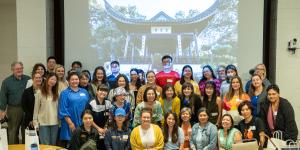On September 29, 2024, the USC U.S.-China Institute hosted a workshop at the Huntington’s Chinese garden, offering K-12 educators hands-on insights into using the garden as a teaching tool. With expert presentations, a guided tour, and new resources, the event explored how Chinese gardens' rich history and cultural significance can be integrated into classrooms. Interested in learning more? Click below for details on the workshop and upcoming programs for educators.
Migration
Visions of Humanity: 20th Century Chinese Paintings from the Jones Collection
This exhibition of approximately thirty paintings and a thirty-minute film featuring the collectors focuses on the work of post-Cultural Revolution artists of the 1980s, who survived that revolutionary period to thrive through the creation of new works that pushed the boundaries of art in China.
Discovering a Musical Heartland: Wu Man's Return to China
The Huntington Library presents a discussion with Wu Man of her music and the life of a musician in remote areas of China, included a documentary film she created.
Performing Asia: South of Gold Mountain
Asia Society Texas hosts a performance by H.T. Chen & Dancers to celebrate the history of Chinese settlers of America prior to World War II.
The Rising Stakes of Refugee Issues in China
A roundtable discussion presented by the Congressional-Executive Commission on China
Last Train Home
Fan Lixin follows a migrant worker couple on their annual trek home to Sichuan Province where their children are being raised by family members.
The Place of Provenance: Regional Styles in Tibetan Painting
The fourth in a series of exhibitions curated by the renowned Tibetan scholar David Jackson, The Place of Provenance: Regional Styles in Tibetan Painting explores the four distinctive provincial artistic styles of Tibet as well as those of Bhutan, Mongolia, and Qing-dynasty China.
EASC Special Film Screening: "Imported From China (2013)"
Indiana University East Asian Studies Center hosts a screening of "Imported From China"
Traversing Boundaries: Bridging Asian and Asian American Studies through Critical Mixed Race
UCLA Center for Chinese Studies hosts a talk with Emma Teng on the identities of mixed Chinese Eurasian families during the Chinese Treaty Port Era.
Encountering Africa: Racial Attitudes of the Chinese in Guangzhou, China
Min Zhou, Professor of Sociology and Asian American Studies will give a talk on African migration in Guangzhou, China.
Chinese and Western Perspectives on the Jewish Community of Kaifeng
Chinese and Western scholars usually drew drastically different conclusions of how the Jewish community of Kaifeng came to be. Lihong Song's reflections on the differences will not only lay bare the orientations of Jewish studies in China, but also shed light on the worlds in which we live.
Pages
Featured Articles
Happy Lunar New Year from the USC US-China Institute!
Events
Ying Zhu looks at new developments for Chinese and global streaming services.
David Zweig examines China's talent recruitment efforts, particularly towards those scientists and engineers who left China for further study. U.S. universities, labs and companies have long brought in talent from China. Are such people still welcome?






